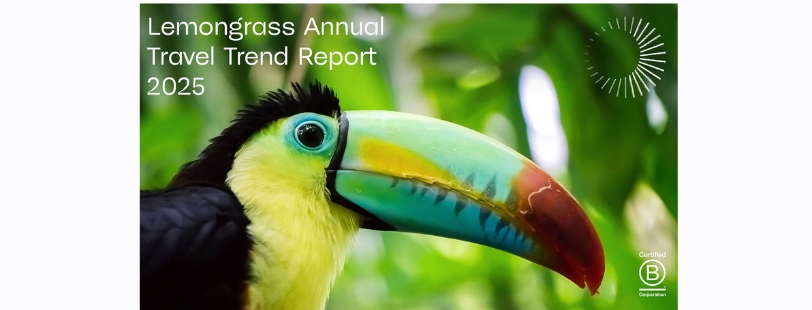
Lemongrass reveals 17 trends shaping tourism in 2025
Over the past year, the tourism industry has seen it all: A backlash against overtourism and travellers seeking alternative holiday destinations. A surge in tech integration and the desire to get back to basics. An increase in short getaways and lifestyle changes that allow for months on the road. And, the desire to hold onto the good ol’ days of blissfully sanitized holidays and the realization that the future of travel needs parameters and guidance to mitigate ballooning carbon emissions. tourism trends 2025
As we look ahead to 2025, the global travel and tourism industry is witnessing significant shifts in traveller behavior and industry practices. The newly released Annual Travel Trend Report 2025 from Lemongrass, a B Corp-certified PR and content agency for travel brands reveals a profound evolution in how people explore the world. The report features commentary from various travel media experts and insight from leading industry changemakers.
From the backlash against over-tourism to the rise of Frontier Travel and the ‘Tofu Tourism’ movement, the travel trends identified by Lemongrass reflect current societal shifts and a glimpse into the future of travel.
The report concludes with certainty that travel is always changing, and it is inherently intertwined with societal-level issues and movements.
Tara Schwenk, Head of Content Marketing and Search at Lemongrass said:
“Our 2025 Travel Trends report paints a picture of an industry in transition, where sustainability, ethical considerations, and a desire for authentic experiences are at the forefront of traveller’s minds.
As the global tourism landscape continues to evolve, it’s clear that these trends are not just fleeting fads but indicative of a broader shift towards more responsible and intentional travel.
Positively, the travel industry is increasingly responding with action, which is crucial in shaping the future of global tourism, ensuring that it remains a force for good in the years to come.”
Here are the travel trends that will shape 2025 tourism trends 2025
1. Go Home, Tourists! Destinations Respond to the Fallout of Poorly Planned Tourism
Destinations have responded with a wide spectrum of solutions: In Barcelona, local authorities removed a bus route from Google Maps to stop tourists from jumping on board. Tourists now encounter alcohol restrictions in Spain’s Balearic Islands. Daytrippers must pay a fee in Venice. A massive barrier now blocks a picture-perfect view of Mt. Fuji in an attempt to keep overcrowding at bay.
2. Going Where No One Has Gone Before
From the deepest depths of the seas across the polar regions to the highest mountains and into
outer space, if a place exists, it is now fair ga e for tourism. “Frontier tourism” is considered an exclusive and extreme form of adventure travel that is often prohibitively expensive for most people, the only benefit being that it feeds the ego.
3. Epic Overland Train Expeditions
The unknown challenges associated with travel have mostly disappeared: the globe is mapped, apps remove language barriers in real-time, and transport can be booked from the comfort of home. Our tech-saturated world means traditional expeditions are no longer necessary and increasingly difficult. This has also given rise to a sense of nostalgia, a desire to travel “the hard way,” and a resurgence in long-haul train journeys.
4. Transformational Holidays, But Make Them Ethical
The days of going on holiday to do nothing seems to be waning as travellers seek out more purposeful, interactive experiences. Active learning opportunities, arts and cultural classes, and immersive education is top of mind as people prioritise travelling with a purpose and engaging with local communities in a meaningful way. This is good news for both tourism and host destinations, as
these kinds of experiences often disperse tourists beyond popular attractions, help preserve local skills and stories, and keep more economic resources within communities. Moreover, people are willing to pay: 79% of Millennials and Gen Z said the quality of an experience is more important than the price.
5. The Ongoing Luxury + Sustainability Struggle
Even as people become more aware of their environmental footprint, they’re hesitant to give up the comforts they’ve come to expect on their travels. They want the opulence delivered by infinity pools and extensive meal options catering to high-end tastes: This is how luxury has been defined in tourism, and giving that up for something far more environmentally friendly — or at least destination-appropriate — is sometimes a tough sell.
6. Cool-Cationing’s Ripple Effects Redefine Seasonality
Much of the planet has been on fire over the last two years, and many tourist destinations are feeling the burn. Greece, Italy, the United States, and Australia are just a few of the countries that have suffered from wildfires, sweltering temperatures, and intolerable holiday conditions. As temperatures
continue to rise, people are turning away from hot beaches toward more moderate holiday destinations.
Google Trends data shows a 300% increase in the search term “cooler holidays” compared to the same time 12 months ago.
7. Fan Fares Ignite Event Tourism
All eyes have been on Taylor Swift and her five-continent Eras Tour, which generated more than a billion dollars for the U.S. travel industry in 2023 alone. Swifties aren’t the only boon to event tourism, though:
Many popular artists have announced global tours for 2025, including eco-conscious Billie Eilish and Coldplay.
8. Grounding Getaways: The Movement That Earths People
grounding (also known as earthing). It is what it sounds like: activities that put the skin directly in
contact with the Earth’s surface, such as walking or running barefoot, laying on the ground, or submerging the body in natural water sources like rivers, streams, and lakes.
9. Sustainability: The Ultimate Risk Manager
If consumer demand is what it takes for travel companies to embrace sustainability, the time has
come to get on board. According to Deloitte research, one in three UK consumers say that
whether a product or service supports biodiversity is a relevant consideration when deciding what to purchase. A quarter of consumers are also willing to pay more for these goods and services.
10. Data and Divination: Bridging Tech Medicine and Traditional Healing
The next wave of medical tourism has arrived. As travellers seek tailored and proactive care, many health-related operators have responded with packages combining comprehensive diagnostic assessments and wellness activities.
11. Agritourism Grows Up as Travellers Go Back – and Give Back – To the Land
food comes from. This unsurprisingly coincides with the shift in people seeking more back-to-nature experiences and a desire to travel more sustainably. Marry the two and an evolved version of agritourism (a form of eco-tourism) emerges.
12. Travel Choices Reflect Lifestyle Realities – Micro and Macro Travel
If one word sums up 2024, it’s “uncertainty.” Unpredictable weather patterns, political turbulence,
and a cost-of-living crisis have travellers reeling. They want to go on holiday, but they are also willing to embrace flexibility with the hope of finding last-minute bookings at rock-bottom prices. Many travellers are booking within the month of travel. As long as they can find the deals they’re looking for, this trend is likely to continue — and grow in popularity — in the years to come
Tourism is often a reflection of changing personal and societal circumstances, and that’s come into
play with the interest in both micro- and macro-tourism.
On the micro-tourism side, Google Trends indicates searches for “best short vacations” are up 100% over the past year. Likely responding to the cost-of-living increase, more people are taking five days or less of annual leave to travel, squeezing in as much as possible within those few days.
13. Destination Dupes
These are among the alternative (but comparable) destinations holiday planners are seeking out that promise to be less expensive and crowded than popular hotspots, making this the year of the “destination dupe.”
Hold the meat: the future of tourism appears to be vegan. Societal awareness and acceptance
of veganism is surging, as people cut meat and other animal products out of their diets for health, environmental, and ethical reasons. This has seeped into the tourism industry, which is transforming with more vegan meal options, vegan-based tours, and all-vegan cruises. Vegan travel agencies like Escape To cater to vegan travellers’ specific needs by curating itineraries and
organising tours that incorporate local vegan restaurants, cooking classes, and visits to animal sanctuaries.
A great place to visit must first be a great place to live, which is why the attention given to reimagining urban design matters in tourism – especially since the world’s urban population is expected to increase 1.5 times to 6 billion people by 2045. With an eye on environmental, social, economic, and cultural desires and needs, the cities of the future must be able to respond to this growing population and its evolving circumstances.
16. Neurodiverse Travel
developmental norms, which include autism, tourettes, dyslexia, and ADHD.
In 2019, Mesa, Arizona, became the first autism-certified city in the world, which means at least 80% of guest or public-facing staff have received training in autism and sensory disorders. High Point, North Carolina followed in 2021 as did Visalia, California in 2022.
Several other destinations such as Dubai are currently working towards certification.
Tour operators have also responded to this growing need by tailoring travel options for neurodiverse people. WanderRock opened its doors in 2023 specifically to serve neurodiverse travellers in their 20s and early 30s with hands-on, curated experiences.
17. Spontaneity Seekers: Last Minute Is Here To Stay
If one word sums up 2024, it’s “uncertainty.” Unpredictable weather patterns, political turbulence, and a cost-of-living crisis have travellers reeling. tourism trends 2025
They want to go on holiday, but they are also willing to embrace flexibility with the hope of finding last-minute bookings at rock-bottom prices. Many travellers are booking within the month of travel. As long as they can find the deals they’re looking for, this trend is likely to continue — and grow in popularity — in the years to come.
To be sure, spontaneity is not just about great deals. With so many aspects of life structured and scheduled, travel is one area that leaves room for flexibility. Perhaps this has increased the appeal
of eleventh-hour bookings, one-way tickets, and other opportunities that nudge open the door of curiosity. tourism trends 2025












